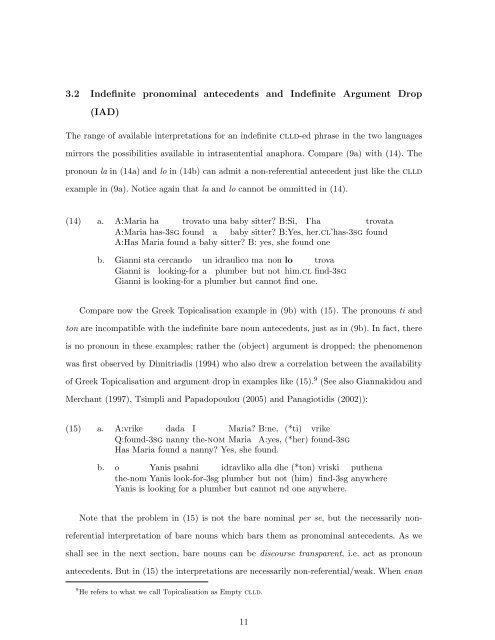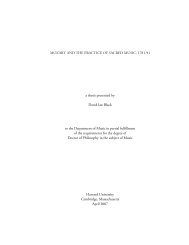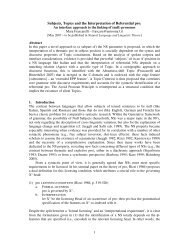draft of November 2011
draft of November 2011
draft of November 2011
Create successful ePaper yourself
Turn your PDF publications into a flip-book with our unique Google optimized e-Paper software.
3.2 Indefinite pronominal antecedents and Indefinite Argument Drop<br />
(IAD)<br />
The range <strong>of</strong> available interpretations for an indefinite clld-ed phrase in the two languages<br />
mirrors the possibilities available in intrasentential anaphora. Compare (9a) with (14). The<br />
pronoun la in (14a) and lo in (14b) can admit a non-referential antecedent just like the clld<br />
example in (9a). Notice again that la and lo cannot be ommitted in (14).<br />
(14) a. A:Maria ha trovato una baby sitter? B:Si, l’ha<br />
trovata<br />
A:Maria has-3sg found a baby sitter? B:Yes, her.cl’has-3sg found<br />
A:Has Maria found a baby sitter? B: yes, she found one<br />
b. Gianni sta cercando un idraulico ma non lo trova<br />
Gianni is looking-for a plumber but not him.cl find-3sg<br />
Gianni is looking-for a plumber but cannot find one.<br />
Compare now the Greek Topicalisation example in (9b) with (15). The pronouns ti and<br />
ton are incompatible with the indefinite bare noun antecedents, just as in (9b). In fact, there<br />
is no pronoun in these examples; rather the (object) argument is dropped; the phenomenon<br />
was first observed by Dimitriadis (1994) who also drew a correlation between the availability<br />
<strong>of</strong> Greek Topicalisation and argument drop in examples like (15). 9 (See also Giannakidou and<br />
Merchant (1997), Tsimpli and Papadopoulou (2005) and Panagiotidis (2002)):<br />
(15) a. A:vrike dada I Maria? B:ne, (*ti) vrike<br />
Q:found-3sg nanny the-nom Maria A:yes, (*her) found-3sg<br />
Has Maria found a nanny? Yes, she found.<br />
b. o Yanis psahni idravliko alla dhe (*ton) vriski puthena<br />
the-nom Yanis look-for-3sg plumber but not (him) find-3sg anywhere<br />
Yanis is looking for a plumber but cannot nd one anywhere.<br />
Note that the problem in (15) is not the bare nominal per se, but the necessarily non-<br />
referential interpretation <strong>of</strong> bare nouns which bars them as pronominal antecedents. As we<br />
shall see in the next section, bare nouns can be discourse transparent, i.e. act as pronoun<br />
antecedents. But in (15) the interpretations are necessarily non-referential/weak. When enan<br />
9 He refers to what we call Topicalisation as Empty clld.<br />
11
















